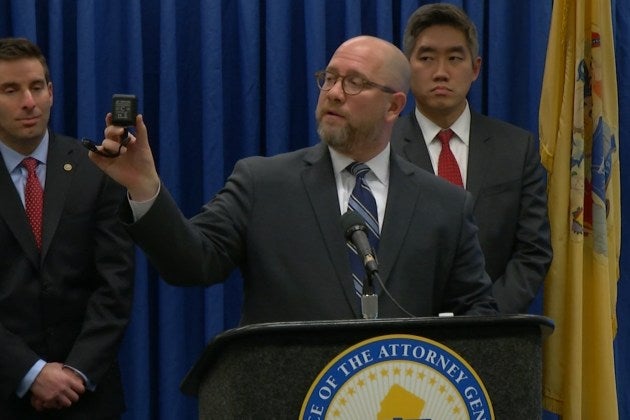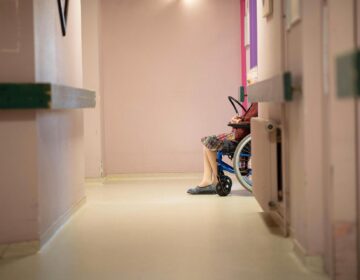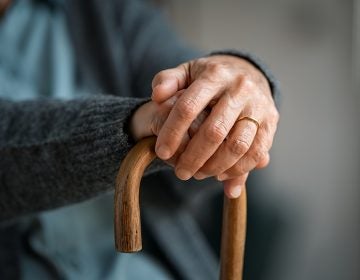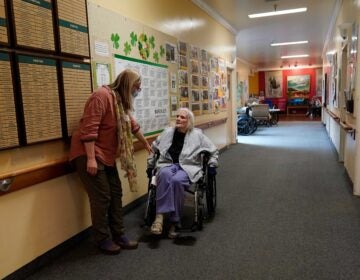New Jersey offers ‘Care Cam’ to nursing home patients, families
Listen 4:05
New Jersey Attorney General Chris Porrino showing one of the cameras the office lends out to those wishing to keep tabs on those caring for elderly relatives (New Jersey Department of Consumer Affairs)
A state-run program employing hidden cameras to prevent and catch elder abuse in New Jersey is reaching new territory.
Attorney General Christopher Porrino launched Safe Care Cam in December. The program, run by the Department of Consumer Affairs, lends small surveillance cameras disguised as everyday objects to state residents for up to 30 days.
The program had been open only to families who’ve hired live-in caretakers or certified home health aides. Now, the cameras can be used in nursing homes and assisted living facilities across the state.
“The initiative is really designed to do two things — provide peace of mind to those New Jersey families who’ve entrusted the care of their loved ones to someone else,” Porrino said. “And also to send a loud message to any unscrupulous providers or abusers … we’re watching, and, if you abuse a patient, we will prosecute you to the fullest extent under the law.”
Rich Allegretti said he thinks it’s too bad that Safe Care Cam wasn’t rolled out earlier. Allegretti is a soft-spoken Navy veteran who has lived near Trenton, in Hamilton Township, New Jersey his whole life. When his mother-in-law was diagnosed with dementia in her 60s, he knew he needed to get help.
“She got dementia early. And we couldn’t handle her physically, because she was getting a little violent. She couldn’t take care of herself,” he said, holding back tears. “I think we all felt guilty.”
Guilty, he said, because she couldn’t keep living at home alone. Though she spent much of her retirement traveling the world, as dementia set in, she needed around-the-clock care. And at the same time, his father-in-law’s health was in decline. Allegretti knew his family couldn’t handle taking care of both of them at the same time. So, they moved his mother-in-law into the dementia wing of a facility close by — so close that they’d visit once, maybe twice a day. But then, she started to complain of pain.
“Somehow, she got out of bed. She was apparently left alone. I don’t know if she was strapped in or not. We never got a clear message, that I recall,” Allegretti said.
She shattered her femur twice — within three weeks. She underwent two painful surgeries that involved repairing her broken leg with plates and screws. And Allegretti wouldn’t learn what really happened until he contacted a lawyer to investigate.
Craig Hubert, a Trenton native and a partner at the firm Szaferman Lakind, took on the case.
“We did eventually get straight answers, and we did learn what we believe to be the truth,” he said, adding that footage from a hidden camera would have made the investigation easier. He believes a camera would have prevented her second fall.
According to the Centers for Disease Control and Prevention, falls are “among the 20 most expensive medical conditions,” and the average treatment cost is more than $30,000. Allegretti later settled the case out of court.
“This was a mistake, and, quite frankly, if there had been a video camera in that room after the first fracture, the administration, the nurses, and all of the caregivers would have learned from the improper transfer procedure,” Hubert said.
Still, few institutions want to be watched. Jon Dolan, president and CEO of the Health Care Association of New Jersey — which represents 372 skilled-nursing facilities and 227 assisted-living facilities across the state — is concerned.
“We were surprised to hear about the expansion of the program into assisted-living and skilled-nursing facilities. Sadly, we received no notice,” he said.
If a family wants to install hidden cameras in their home, Dolan said, that’s their decision. But a long-term care facility is a different challenge because of the rights of residents there.
A facility cannot film a resident bathing or toileting, for example. There’s a right to privacy — for the health care aide and also for the roommate of a resident whose family has installed a hidden camera. There’s also the thorny issue of consent, which might be a concern for residents with a medical diagnosis, such as dementia.
“I do concede that it is a concern, because it does exist in many nursing homes. But families could just try to limit the field of the video, so that you would just be focusing on a resident that consents or the family member that consents to the video,” Hubert said.
Porrino said the law doesn’t prohibit families from installing these cameras at nursing homes; Dolan disagreed.
“Maybe he’s saying the silence in the law is consent to allow families to do it,” Dolan said. “But families, last time I looked, are not allowed to come on private property, put a camera on private property, because they think they’re doing an investigation about care.”
If local law enforcement asked to install a hidden camera for an investigation with probable cause, Dolan said he’d advise the facility to cooperate.
One in 10 Americans 60 or older have experienced some sort of elder abuse, according to the National Council on Aging. Some incidents of abuse were caught on video and uploaded online, which prompted community outrage and activism. New Jersey requires certified health aides to be supervised by nurses and employed by health agencies, but the state Board of Nursing has disciplined a third more aides this year.
In 2016, more than 306 home health aides had their licenses revoked, suspended, or were disciplined by the state. The New Jersey Department of Health makes available quality assessment reports of nursing homes on its website, and Medicare.gov offers a tool to compare nursing home facilities.
Porrino’s office is not saying how many cameras it has, and how many are out there — and, of course, they’re hidden. So, we may never know how many families are recording who’s taking care of their loved ones.
WHYY is your source for fact-based, in-depth journalism and information. As a nonprofit organization, we rely on financial support from readers like you. Please give today.





